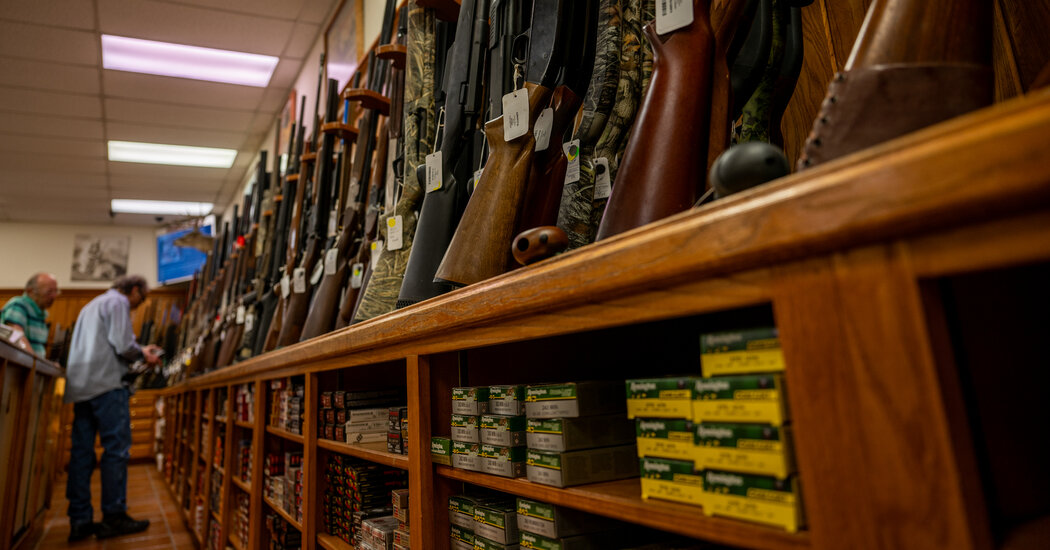The Biden administration on Thursday proposed the broadest expansion of firearms background checks in decades, leveraging a provision of the bipartisa
The Biden administration on Thursday proposed the broadest expansion of firearms background checks in decades, leveraging a provision of the bipartisan gun control law passed last year that requires thousands of unlicensed firearms brokers to register as federally licensed dealers.
The regulations, drafted by the Bureau of Alcohol, Tobacco, Firearms and Explosives, are intended to close loopholes involving gun show and internet sales. They are part of President Biden’s piecemeal efforts to enact a key policy goal, universal background checks, which has been repeatedly stymied by congressional Republicans.
Federal law requires background checks only for purchases made through the about 80,000 firearms sellers who are “engaged in the business” of selling, shipping, importing or manufacturing weapons. But unlicensed private sellers in many states have been able to legally sell at gun shows, out of their houses and through online platforms without having to submit to the criminal and mental health background check required for the tens of thousands of gun sellers regulated by the government.
The proposed rules are intended to close the gap between state and federal law by requiring anyone who earns a profit from selling firearms to obtain a federal license and conduct background checks. Dealers have previously been required to join the federal system only if they derived their chief livelihood from selling weapons. Failing to register carries a penalty of up to five years in prison and $250,000 in fines.
“An increasing number of individuals engaged in the business of selling firearms for profit have chosen not to register as federal firearms licensees,” Steven M. Dettelbach, the A.T.F. director, said in a statement. “Instead, they have sought to make money through the off-book, illicit sale of firearms.”
Scores of guns used in crimes have been purchased through this shadow market, increasingly through online marketplaces, like Armslist, a Craigslist for firearms that matches buyers and sellers. In October, a 19-year-old with a history of mental health issues was denied an AR-15-type rifle at a federally licensed dealer near St. Louis. Shortly thereafter, he bought one through Armslist — this time without a background check — then used it to kill two people and injure several others.
The new rules, now subject to a 90-day public comment period, are not likely to go into effect for months. But President Biden had made clear he wanted the rules enforced as quickly as possible, according to a senior Biden administration official who was not authorized to speak publicly about the deliberations.
The regulations are likely to prompt lawsuits from gun rights groups. Moments after the move was announced, Gun Owners of America, a group that has opposed all of Mr. Biden’s gun control efforts, called the rule a “backdoor” universal background check and said in a statement that “our attorneys will be preparing a lawsuit.”
Nonetheless, the administration believes the regulations are on solid legal footing, because they are rooted in a newly passed law, rather than a novel interpretation of an existing one.
A.T.F. has hashed out the details over the past several months, in consultation with Justice Department lawyers and White House officials. Gun safety groups, including Brady and Giffords, have pushed to set a fixed number of transactions — five — that would establish a clear threshold for a gun dealer to register as a federal licensee. But A.T.F. lawyers opposed that idea and opted for a more nebulous definition that they believed would better withstand legal challenges.
“This is a policy that will move an untold number of gun purchases out of the shadows and into the regulated market,” said Peter Ambler, executive director of Giffords.
“But this is going to come down to how aggressively and effectively this rule is implemented and enforced,” he added. “It’s going to be a major challenge.”
A.T.F. officials have not said how many private sellers might be covered by the new law, with estimates ranging from fewer than 30,000 to hundreds of thousands. A 2015 survey of roughly 1,600 gun owners found that over the previous two years, 22 percent said that they had obtained firearms without being screened. Half of those who had purchased guns privately — somewhere other than a store or pawnshop — also said they were not screened.
Senior administration officials offered no details on how small-scale gun dealers would gain access to the background check system, which is administered by the Federal Bureau of Investigation. Still, the regulations allow smaller vendors to use the resources of brick-and-mortar gun shops that are federally licensed to run background checks.
The regulations give investigators broad latitude to identify unlicensed dealers through their conduct, such as exhibiting a willingness to buy guns for a customer on demand, spending heavily on firearms purchases or using “sham businesses” to hide transactions.
The rules exempt “genuine hobbyists and collectors” who buy and sell to enhance their collections, rather than to turn a profit.
www.nytimes.com

COMMENTS